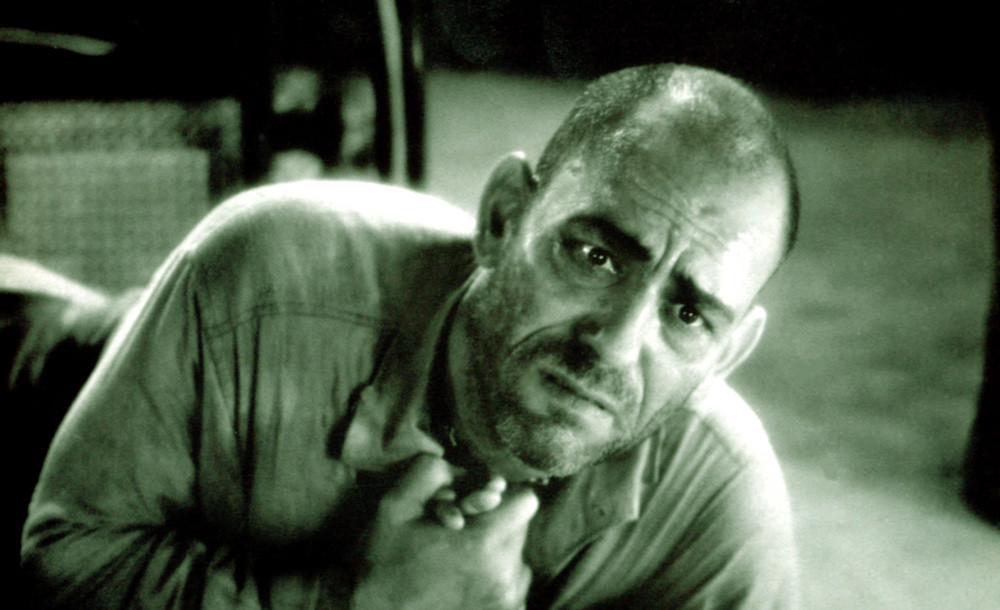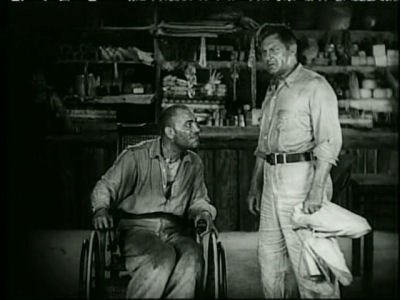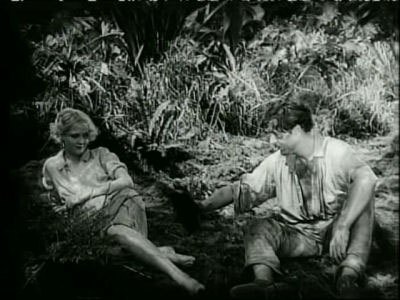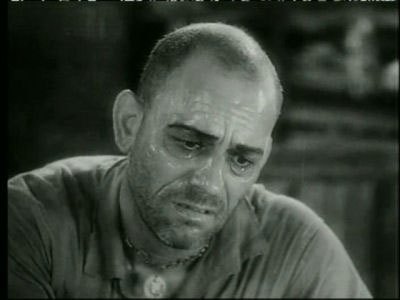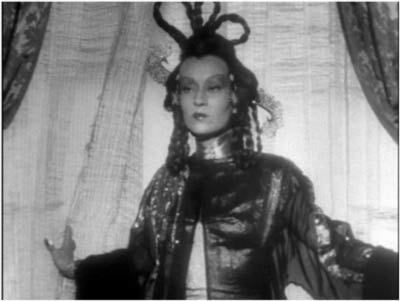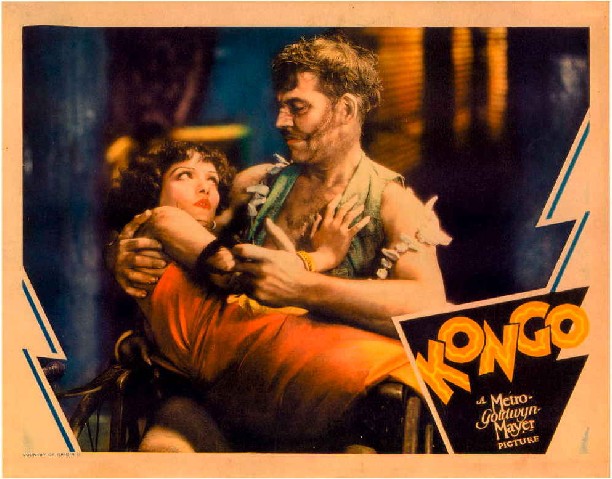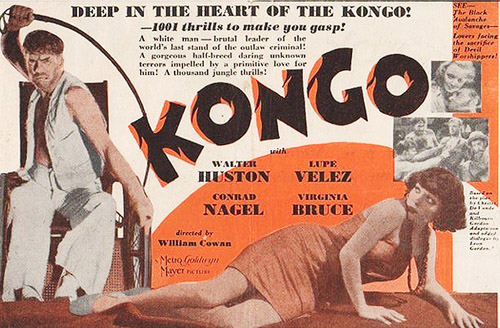Lon Chaney at his most grotesque. A slimy revenge picture that involves Chaney’s quest for revenge against the man who stole his wife and crippled him. Mary Nolan and Lionel Barrymore support. Wonderful but not for all tastes. A slightly warped mind is recommended. Maybe even required.
Home Media Availability: Released on DVD and via streaming.
Bonus: I will also be reviewing the 1932 pre-code remake (entitled Kongo) and the similarly plotted 1941 film The Shanghai Gesture, starring Gene Tierney and Victor Mature and directed by Josef von Sternberg. Click here to skip to the talkie reviews.
A repulsive concept. Let’s film it.
Lon Chaney is a legend, one of the few silent stars who still enjoys some measure of name recognition. His talent with makeup is still considered remarkable. He could transform himself into anything or anyone, it seemed. Well, I’m going to let you in on a little secret about Chaney. You know, the guy who played the Phantom of the Opera and the Hunchback of Notre Dame, the Man of a Thousand Faces…
(Whisper)
He was even scarier with no makeup at all. Don’t believe me? Then let me present you with West of Zanzibar, a delightfully trashy melodrama from the very end of the silent era.
Chaney plays Phroso, a stage magician who dearly loves his beautiful wife Anna (Jacqueline Gadsden). But she is about to run away to Africa with her lover, an ivory trader named Crane (Lionel Barrymore). Phroso discovers what is afoot, a struggle ensues and Crane shoves him off a balcony. The fall breaks Phroso’s back and renders him paraplegic.
Months pass and word comes that Anna has returned. And she has a baby. Surely Crane’s daughter! Anna is already dead when Phroso reaches her. He swears over her body that he will get revenge on Crane and his daughter.
Flash forward to Africa almost two decades later. Deep in the jungle, Phroso has set himself up as a witch doctor who rules the local tribes. Now called Dead-Legs, he impresses the natives with twisted versions of his old stage tricks. He has spent the last eighteen years preparing his vengeance.
Dead-Legs has surrounded himself with equally seedy expats who help him steal Crane’s ivory as it travels through the jungle. Doc (Warner Baxter, the first on-screen Jay Gatsby) is a dissolute physician who has the duty of keeping Dead-Legs’s decaying body together a little longer. The years of planning are finally over and Dead-Legs sends his men to fetch Crane’s daughter, Maizie.
Dead-Legs had given Maizie to the care of a barkeeper in Zanzibar, intending her to grow up in the lowest of dives. Maizie is a product of her environment, an alcoholic who is decaying from the inside out. Maizie is told that her father is waiting for her. She recognizes a chance to make a fresh start and resolves to stop drinking. The resolve doesn’t last beyond her first night in Dead-Legs’s village. Tortured and driven to the brink of insanity by Dead-Legs and his men, she takes refuge in cheap brandy. Seeing Maizie suffer starts to awaken Doc’s long-buried sense of humanity.
Dead-Legs, on the other hand, relishes the first stages of his revenges and prepares for the grand finale. He sends word to Crane that he is the one who has been stealing the ivory.
The tribesmen have a custom. When a man dies, a female relative must be burned alive on the funeral pyre. Dead-Legs has made sure that the entire village knows that Maizie is Crane’s daughter. You can see where this is going. All the pieces are in place. Dead-Legs prepares for his final magic show. But, naturally, there is a terrible secret that will reveal itself at precisely the wrong moment. Anyone familiar with silent era plotting will see this twist coming. Let’s just say that it is a shame for all involved that DNA tests were not available in 1928.
West of Zanzibar was one of the last and most successful pairings of director Tod Browning and star Lon Chaney. Sleazy doesn’t even begin to describe it. And no one could do sleazy quite as well as Chaney and Browning. The atmosphere of the film matches the sordid nature of the material: thick, sweaty and grimy. You can practically feel the heavy, humid jungle air waft out of the screen.
The plot is simple and not particularly original. The 1926 play upon which it was based, Kongo, borrows heavily from 1918’s The Shanghai Gesture with a few of the gender roles reversed. But more on that later.
With a powerhouse like Lon Chaney in the lead, the plot becomes secondary. Chaney consumes scenery with a passion matched only by Lionel Barrymore. Lionel always was my favorite Barrymore. Chaney had previously played a disabled maniac in The Penalty. Blizzard, a legless criminal mastermind, had raised more than a few eyebrows in 1920 with its portrayals of drug addiction, debauchery and violence.
The world was a lot less innocent in 1928 but the critical reaction was equally hostile. The film was deemed trashy and beneath the talents of the star and director. That’s a bit harsh since both Chaney and Browning knew exactly what they were doing. Both had a flair for the grotesque and West of Zanzibar allowed both create a bit of escapism that indulged their unique aptitudes. It should also be noted that the film had several more disturbing scenes cut. That’s right, this is the censored version. One can only imagine what the original was like.
What is more difficult to forgive is the clichéd, imperialistic view of Africa and Africans. Platitudes about cannibals, voodoo and human sacrifice abound. Not for the easily offended. But if you are easily offended, I don’t think you would even start watching a movie featuring mutilation, addiction, abuse and bloody horrible revenge.
Besides Chaney, Barrymore and Browning, West of Zanzibar also boasts a gifted leading lady. Lovely Mary Nolan had a talent for looking both dissipated and angelic. At the same time. No easy task and it works perfectly for Maizie. A debauched innocent, Maizie longs for roots, she wants to know who she is and find her family.
There is a well-played scene when she first meets Dead-Legs. He comes writhing toward her and she is terrified but hopeful. Could he be her father? Nolan makes it clear from her expression that Maizie both hopes it’s true and hopes that it isn’t.
Lionel has always been my favorite Barrymore and his portrayal of the smug Crane almost makes you root for Dead-Legs. But in the end, the film belongs to Chaney. Crawling on the ground, his face contorted with hatred, he is truly a terrifying figure. The scene where Dead-Legs discovers just how much his single-minded vengeance has cost him is heartbreaking. The barely-restrained tears, the look of horror. I hated Dead-Legs and I felt sorry for him. More than that, I actually cried for him.
Sheesh! Only Chaney does that to me.
West of Zanzibar was remade in 1932 as Kongo, with Walter Huston in the Chaney role. The Shanghai Gesture finally made it to movie screens in 1941, directed by Josef von Sternberg and starring a young Gene Tierney.
West of Zanzibar is not for everyone. Fans who prefer to think of silent movies as sweet little romances are advised to stay far, far away. However, if you’re just a little twisted, ready for some pre-Code entertainment or a fan of Chaney’s, you will probably find West of Zanzibar a forgotten jewel, albeit a rather seedy one.
Movies Silently’s Score: ★★★★★
Where can I see it?
West of Zanzibar has been released on DVD by Warner Archive. It comes with its original synchronized score.
Silents vs. Talkies
West of Zanzibar vs. The Shanghai Gesture
Ladies and gentlemen, in this corner we have West of Zanzibar, a delightful bit of trash from the one and only Lon Chaney. And in that corner we have The Shanghai Gesture, a sordid trinket from the camera of the great Josef von Sternberg. Who will be named champion of this tacky plot? Let the fight begin!
The Talkie Challenger: The Shanghai Gesture
Take a play from the 1918 set in a Chinese bordello presided over by a woman named Mother Goddamn who addicts her enemy’s daughter to drugs for revenge. Only when it is too late does she discover the girl’s terrible secret.
Now try to make a motion picture out of it circa 1940. You can immediately see the problem faced by the producers of The Shanghai Gesture. It’s one thing to clean up a plot for the censors. It’s quite another to take a play that revolves around vice and make it into a film that the Breen brigade would approve of. Josef von Sternerg, famous for film Marlene Dietrich so beautifully, was given the task of turning The Shanghai Gesture into something socially acceptable while still keeping some semblance of the original story.
Mother Goddamn was turned into Mother Gin Sling (actually an improvement, in my opinion), the bordello became a casino, the drug addiction became gambling and all the sleaziness was implied rather than shown. And if any director could put across an air of sleaze, it was von Sternberg.
And the winner is…
THE SILENT
The problem this film has is that von Sternberg’s pacing is slower than molasses. This is a problem with many von Sternberg sound films but it is particularly irritating here. His photography is as beautiful as ever but he does linger so. With the wacky, tacky plot, you expect a more frantic pace.
Another problem is that the leading lady is Gene Tierney, a lovely creature but a rather limited actress. As Poppy, she comes off as more of a petulant party girl than a tragic figure drawn into vice. The part required acting chops that the poor young lady simply did not possess. Victor Mature, on the other hand, is unexpectedly good as Doctor Omar, one of Mother Gin Sling’s toadies.
As Mother Gin Sling, Ona Munson does as well as can be expected. Caked in Asiatic makeup and elaborate headdresses, her more subtle expressions and gestures are lost. I can’t blame the actress. The part really is quite a silly one. Hollywood had yet to learn that big hairpins and heavy eyeshadow do not an Asian make.
Spoiler: It is one thing for a man to never meet his child. It is quite possible for him to doubt paternity and to not recognize his offspring. For a woman to not know that she has a child requires many more plot gymnastics and they do not come off very well. There are just physical reasons why a woman would know she has a child. Like, you know, being pregnant. A woman tends to notice something like that. Madam Gin Sling is meant to be a dragon lady-style villainess and instead comes off as hopelessly clueless. End spoiler.
The Shanghai Gesture‘s plot was lifted for West of Zanzibar but many of the plot problems were solved by switching the gender of the villain. The bottom line is, though, that the film was made at the wrong time and by the wrong people. The less oppressive censorship of the silent era, combined with Cheney’s macabre taste, created a nasty little gem of a picture. West of Zanzibar remains the champ.
Availability: Released on DVD and via streaming.
But wait, there’s more!
Walter Huston, who played the object of Mother Gin Sling’s hatred, actually created the role of Dead Legs in the original stage version of Kongo, the play upon which West of Zanzibar was based, and he took over the lead role for the 1932 remake. Got that? The pre-Code feature co-starred Conrad Nagel, Lupe Velez and Virginia Bruce.
How does it measure up to the Chaney version? Well, first the bad news: the fact that it has sound makes the racist attitude toward the native people even more obvious. The actors speak a clearly made-up “African” language and those scenes are just painful. Also, the pacing is considerably choppier than in the original. Time jumps whole years ahead and no one in the film fills the audience in. It’s jarring.
Here are the pluses: Lupe Velez is great fun in her spitfire mode (that is, until it is indicated that her tongue is pulled out, brrrr!) Virginia Bruce is a little hammy but still good. And she plays her part as the abused daughter seemingly without makeup and looking like she was dragged through the mud. Very courageous for a beautiful young actress and the gamble pays off. She is utterly convincing. Conrad Nagel plays the doctor as a drug addict, not just an alcoholic, and the film spends a considerable amount of time on his character. I am torn since more time with the Doc means less time with the central two men in the conflict.
First, C. Henry Gordon as Dead Legs’s nemesis: Doesn’t hold a candle to Lionel Barrymore. And Walter Huston. He is very, very good. Extremely good. But there is just some little something lacking in his performance that makes it inferior to Lon Chaney’s. Thinking about it, I believe that the difference is Lon Chaney’s raw physical ability. While Huston does disappear into his character and looks suitable scarred and scummy, Lon Chaney makes you believe that his legs are dead, that he must crawl and that he has been crawling for almost twenty years. Chaney inhabits his character in a way that no other actor could. Huston is excellent. There is nothing wrong with his performance. Its just that Chaney is so perfect in the role.
One more quibble: I think that the scenes between Ann and Dead Legs were far too rushed at the end. And the Doc was much more involved in the scene, which made it have less of a personal, internal impact. In Chaney’s version, he is afforded much more time to digest the change in relationship between himself and Maizie.
So, all in all, Kongo is worth seeing. You’ll just feel like you need a shower after viewing it.
Availability: Released on DVD.
☙❦❧
Like what you’re reading? Please consider sponsoring me on Patreon. All patrons will get early previews of upcoming features, exclusive polls and other goodies.
Disclosure: Some links included in this post may be affiliate links to products sold by Amazon and as an Amazon Associate I earn from qualifying purchases.
